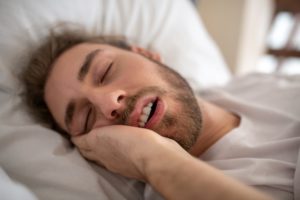Why Do People Snore?
Snoring occurs when air cannot flow freely through the airway as a person sleeps. When the airway is narrowed or partially blocked, breathing causes the tissues of the upper airway to vibrate, resulting in the sound heard when someone snores.
Almost everyone snores occasionally, and snoring can be caused by a person’s anatomy, lifestyle habits, or a sleep disorder called sleep apnea, which disrupts sleep and can lead to other health issues. Understanding the varied causes of snoring can help determine whether snoring is something to be concerned about, and what steps can be taken to address it.
Obstructive Sleep Apnea
Habitual snoring occurs in around
44% of males and 28% of females
in the adult population between ages 30 and 60. Not everyone who snores has obstructive sleep apnea (OSA), but most people with OSA snore. OSA is a common sleep-related breathing disorder that frequently goes undiagnosed. OSA is marked by
repeated lapses in breathing
during sleep due to partial or complete collapse of the airway. People with sleep apnea tend to snore loudly with periods of silence as breathing stops. When they resume breathing, it can sound like gasping or snorting.
OSA is associated with adverse health outcomes such as depression, high blood pressure, and heart disease. OSA can compromise sleep quality, and excessive sleepiness during the day can lead to accidents while driving or at work. Fortunately, OSA treatment can successfully resolve symptoms and reduce one’s risk for harmful health effects. Treatment for OSA includes the use of continuous positive airway pressure (CPAP) devices, lifestyle changes, dental devices, and surgery.
Is Your Snoring a Health Risk?
Answer three questions to understand if you should be concerned.
Alcohol and Sedative Medication
Alcohol and other sedatives cause snoring by relaxing the muscles that support tissue around the airway. Chronic snorers, including those with OSA, experience more severe snoring after drinking alcohol. Physicians often recommend avoiding alcohol and sedative medications in the hours leading up to bedtime to reduce snoring. Although this approach to snoring management has not been evaluated in a randomized clinical trial, some people may experience benefits.
Smoking
Cigarette smoking is another risk factor for snoring. It is not known why people who smoke are more likely to snore, but researchers propose that it may be due to upper airway inflammation and edema in smokers. Quitting smoking has been shown to improve snoring, but it can take time. A study showed that snoring rates remained elevated in those who recently quit smoking, but within four years declined to match the rates seen in people who had never smoked.

Head and Neck Anatomy
The size and shape of certain structures can constrict the airway and lead to snoring. For example, people are more likely to snore if they have a deviated septum , where the wall between nostrils is bent or skewed to one side. Additionally, growths in the nasal passages called polyps, having a small jaw, and having an enlarged tongue or tonsils can contribute to snoring.
Treatment approaches for people who have one of these anatomical causes of snoring include surgery and dental devices. Both methods aim to increase the flow of air in and out of the airway during sleep. These approaches have been shown to be effective in some patients with OSA, but further research is needed to understand their efficacy in people who snore but do not have OSA.
Chronic Nasal Congestion
Having a stuffy nose during sleep may lead to snoring by reducing the flow of air through the airway and causing the airway to collapse.
Allergy or infection
are the most common causes of nasal congestion, but other contributors include being in a dry air environment or having a deviated septum. When these conditions persist over time, nasal congestion can become chronic and lead to habitual snoring. A study of middle-aged adults found that those who indicated often experiencing severe nasal congestion at night were
three times more likely
to be habitual snorers.
Treatment for snoring due to chronic congestion depends on the cause, but may include using nasal decongestants or nasal steroids.
Sleeping Position
Snoring occurs more often when you are sleeping on your back, also called supine position. When you are on your back, gravity pulls the tissues surrounding your airway downward, which makes the airway more narrow. Research on snorers has shown that the frequency and intensity of snoring decreases in some patients when they sleep on their side , also called lateral position.
Positional therapy encourages sleepers to avoid sleeping on their backs. There are a variety of approaches to positional therapy for snoring and sleep apnea treatment. These include positional alarms, modified nightshirts, and lateral sleep pillows. Data also suggests that using a special pillow designed to keep the head to the side can decrease snoring.
Excess Weight
Having extra tissue in the neck can lead to a smaller airway size and an increased susceptibility to airway collapse. Weight loss may improve snoring and symptoms of sleep apnea in people with obesity.
Aging
Older age is associated with a number of sleep changes, including increased snoring. The tongue and muscles that surround the airway may become weaker with age. Engaging in mouth and throat exercises called myofunctional therapy may reduce snoring caused by weak muscles. Research has found that myofunctional therapy reduced snoring intensity and frequency .
Hypothyroidism
Hypothyroidism is a condition in which the thyroid gland under-functions and does not produce enough thyroid hormone. If left untreated, it can lead to symptoms such as a puffy face, hoarse voice, slow speech, and slow heart rate. It can also contribute to snoring. Researchers administered sleep studies in twenty hypothyroidism patients and found that all of them snored . Treatment for hypothyroidism involves taking a medication that replaces the thyroid hormone deficiency.
When Should You Speak With a Doctor About Snoring?
Snoring may be a sign of sleep apnea, which may require medical intervention. If you snore and also have any of these other OSA symptoms , it may be time to speak with a doctor:
- Pauses in breathing during sleep followed by choking, snorting, gasping sounds
- Waking up frequently at night
- Daytime sleepiness
- Morning headaches
Snoring often goes unnoticed by the snorer. Sometimes, a bed partner or housemate alerts the affected individual about their snoring and other nighttime OSA symptoms. It could also be helpful to talk with a doctor if your snoring is affecting your bed partner’s sleep and you would like to explore treatment options.

Still have questions? Ask our community!
Join our Sleep Care Community — a trusted hub of sleep health professionals, product specialists, and people just like you. Whether you need expert sleep advice for your insomnia or you’re searching for the perfect mattress, we’ve got you covered. Get personalized guidance from the experts who know sleep best.
References
15 Sources
-
Rowley, J. A. (2021, April 12). Snoring in adults. In M. S. Badr (Ed.). UpToDate., Retrieved December 19, 2022, from
https://www.uptodate.com/contents/snoring-in-adults -
A.D.A.M. Medical Encyclopedia. (2022, January 2). Obstructive sleep apnea – adults. MedlinePlus., Retrieved December 19, 2022, from
https://medlineplus.gov/ency/article/000811.htm -
A.D.A.M. Medical Encyclopedia. (2021, July 19). Snoring – adults. MedlinePlus., Retrieved December 19, 2022, from
https://medlineplus.gov/ency/patientinstructions/000720.htm -
Issa, F. G., & Sullivan, C. E. (1982). Alcohol, snoring and sleep apnea. Journal of neurology, neurosurgery, and psychiatry, 45(4), 353–359.
https://pubmed.ncbi.nlm.nih.gov/7077345/ -
Bloom, J. W., Kaltenborn, W. T., & Quan, S. F. (1988). Risk factors in a general population for snoring. Importance of cigarette smoking and obesity. Chest, 93(4), 678–683.
https://linkinghub.elsevier.com/retrieve/pii/S0012369216345196 -
Dzieciolowska-Baran, E., Gawlikowska-Sroka, A., & Czerwinski, F. (2009). Snoring – The role of the laryngologist in diagnosing and treating its causes. European Journal of Medical Research, 14 Suppl 4(Suppl 4), 67–70.
https://pubmed.ncbi.nlm.nih.gov/20156729/ -
Fried, M. P. (2021, September). Nasal congestion and rhinorrhea. Merck Manual Professional Version., Retrieved December, 19, 2022, from
https://www.merckmanuals.com/professional/ear,-nose,-and-throat-disorders/approach-to-the-patient-with-nasal-and-pharyngeal-symptoms/nasal-congestion-and-rhinorrhea -
Young, T., Finn, L., & Palta, M. (2001). Chronic nasal congestion at night is a risk factor for snoring in a population-based cohort study. Archives of internal medicine, 161(12), 1514–1519.
http://archinte.jamanetwork.com/article.aspx?doi=10.1001/archinte.161.12.1514 -
Nakano, H., Ikeda, T., Hayashi, M., Ohshima, E., & Onizuka, A. (2003). Effects of body position on snoring in apneic and nonapneic snorers. Sleep, 26(2), 169–172.
https://pubmed.ncbi.nlm.nih.gov/12683476/ -
Chen, W. C., Lee, L. A., Chen, N. H., Fang, T. J., Huang, C. G., Cheng, W. N., & Li, H. Y. (2015). Treatment of snoring with positional therapy in patients with positional obstructive sleep apnea syndrome. Scientific reports, 5, 18188.
https://pubmed.ncbi.nlm.nih.gov/26657174/ -
Kryger, M. H. & Malhotra, A. (2022, August 11). Management of obstructive sleep apnea in adults. In N. Collop (Ed.). UpToDate., Retrieved December 19, 2022, from
https://www.uptodate.com/contents/management-of-obstructive-sleep-apnea-in-adult -
Camacho, M., Guilleminault, C., Wei, J. M., Song, S. A., Noller, M. W., Reckley, L. K., Fernandez-Salvador, C., & Zaghi, S. (2018). Oropharyngeal and tongue exercises (myofunctional therapy) for snoring: a systematic review and meta-analysis. European archives of oto-rhino-laryngology, 275(4), 849–855.
http://link.springer.com/10.1007/s00405-017-4848-5 -
A.D.A.M. Medical Encyclopedia. (2020, August 29). Hypothyroidism. MedlinePlus., Retrieved December 19, 2022, from
https://medlineplus.gov/ency/article/000353.htm -
Lin, C. C., Tsan, K. W., & Chen, P. J. (1992). The relationship between sleep apnea syndrome and hypothyroidism. Chest, 102(6), 1663–1667.
https://linkinghub.elsevier.com/retrieve/pii/S0012369216408354 -
Strohl, K. P. (2022, October). Obstructive sleep apnea. Merck Manual Professional Version., Retrieved December 19, 2022, from
https://www.merckmanuals.com/professional/pulmonary-disorders/sleep-apnea/obstructive-sleep-apnea










